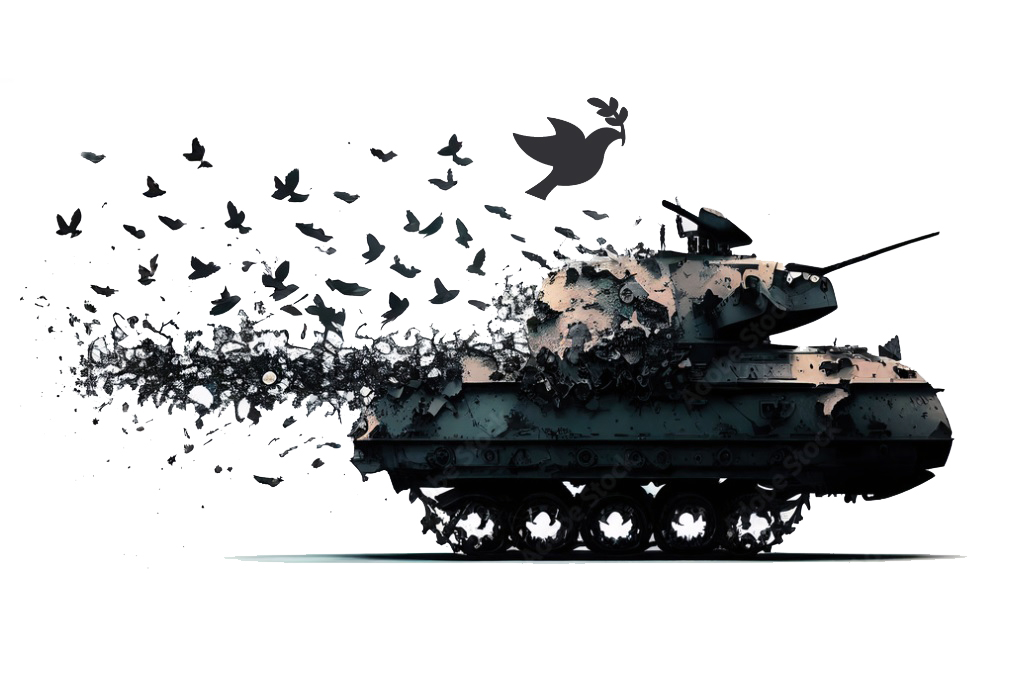
Ten Months and Sudanese Still Echo ``Must Stop``
Alzein Osman
In its tenth month, the war in Sudan has spared no place; its fires have consumed everything. Thousands killed and injured, millions displaced. Families in the open, wandering on the roads with no shelter. Cities under bombardment or turned into ghost towns after their residents left in search of safety. Here, in the words of the Sudanese poet Atef Khairi, even the survivor from slaughter worships a dagger.
In Sudan, the knives of prolonged wars are still present. Those who raise the white flags of peace do so simultaneously with calls to incite the people and urging them to resist the militias. Calls echoed by those who created the Rapid Support Forces one Sudanese morning, later institutionalized through the legislative council.
Well, as thousands gather in the squares armed, ready for battle, they are preceded by the description "the mobilized." There are still those who adhere to their rejecting stance towards war, with their slogan "It must stop." This is the same slogan that emerged on the morning of the war, spoken by those who rejected it and continue to resist.
In its tenth month, Sudans war poses its question: Have the calls to stop it receded, drowned in the echoes of the gunfire brandished by the mobilized awaiting the battle of dignity? Or is arming and its proliferation another necessity to continue demanding its cessation?
In their shuttle journeys between countries and capitals, the leaders of the "Taqadum" alliance, led by Prime Minister Abdullah Hamdok, continue their efforts to stop the war, pledging to do everything they can to achieve this goal. In this context, "Taqadum" announced its readiness to meet with the head of the Sovereignty Council and the army commander, General Burhan, anywhere they specify. However, in return, the "No to War" declared by "Taqadum" finds itself facing campaigns of skepticism, describing it as a truthful word intended for falsehood.
Many see the movements of "Taqadum" as confirmation that the choice to stop the war is still a broad spectrum among Sudanese of various orientations, and they hope that these steps succeed in putting an end to their suffering. What reinforces the desire to stop the war is the state of joy with which the Sudanese greet any news confirming the seriousness of the parties in resuming negotiations and resorting to peaceful solutions. This was evident in the reactions that accompanied the leaks about a meeting between General Shams al-Din al-Kabbashi and Abdelrahim Dagalo to discuss the mechanisms for stopping the war. This step found more welcome than rejection, although questions remain about its effectiveness and its relationship and connection to other negotiation platforms, particularly the Jeddah platform, especially given the conviction of many that it is a war without a victor.
The hypothesis that it is a war without a victor, and in light of its negative repercussions, many who supported the "Just kill" option shifted to the "It must stop" option, becoming supporters of stopping the war and its continuous bleeding. There seems to be no way to end it other than the path of negotiation, even if it is opposed by fortifications.
If al-Kabbashi succeeds in stopping the war, he will become a hero in the eyes of the homeless and the mothers residing in schools where the cold does not spare them. A hero in the eyes of children eager to return to their schools, and in the eyes of young people eager to complete their university studies. He will be a hero in the eyes of Sudanese women who desire nothing more than to sit on the banks of the Nile at sunset. He will be a hero in the eyes of an elderly Sudanese man who wishes to return to his home in Omdurman to finish what remains of his life. He will be a hero in the eyes of volunteers at Nyala Hospital who aspire to return to their normal lives away from the fragments and blood. And he will be a hero in the eyes of Khartoum, which awaits its peace, as its people have been exhausted by death during this senseless war.
These are the ones waiting for peace, and they are the ones who tip the scale towards life in exchange for the scale of death. They are the ones who make the choice "It must stop" more preferable than the "Just kill" option.

